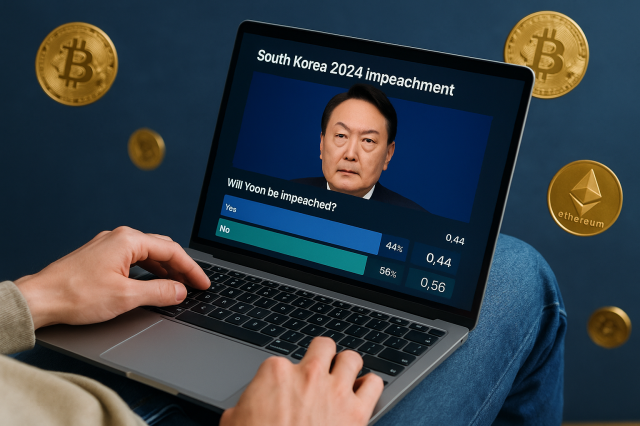
SEOUL, November 14 (AJP) - A research paper published on November 12, 2025, in the MDPI-published journal Information examines how cryptocurrency users around the world reacted to and financially engaged with South Korea's 2024 impeachment crisis. The article, titled "From E-Democracy to C-Democracy: Analyzing Transnational Political Discourse During South Korea's 2024 Presidential Impeachment on Polymarket," analyzes real-time activity on a blockchain prediction platform during the constitutional showdown.
The study was conducted by Park Han-woo, Kim Jae-hun, and Norhayatun Syamilah Osman of YeungNam University's Digital Convergence Business program, Cyber Emotions Research Center and Big Local Big Pulse Lab. Park, who has examined digital political behavior for many years, shared the publication to highlight how online engagement is changing as financial tools and Web3 platforms become more common.
The paper focuses on Polymarket, a blockchain-based prediction site where users place bets on political outcomes using cryptocurrency. On December 14, 2024, as the National Assembly passed the impeachment bill, more than 15.8 million dollars had already been wagered on whether the president would leave office before the end of the year. Users overseas adjusted their positions in real time as events unfolded in Seoul.
The authors describe this emerging pattern as "cryptocurrency-enabled democracy," or c-democracy. In this model, political conversation and financial speculation take place in the same space. Users debate, share links, or post casual remarks while expressing their expectations through money staked on the result.
The study analyzed 582 comments from 83 users shortly after the vote. Although Polymarket does not release demographic information, many commenters identified themselves as posting from the United States, Europe or Asia. The authors argue that this shows how prediction markets can create transnational communities around domestic political events.
Distinct user groups appeared in the data. Some posted detailed political analysis and outside sources, while others reacted with short comments or memes. A smaller group placed large wagers while saying very little. One of the study's key observations is that expressive participation and financial participation did not always align.
The authors acknowledge the limits of studying a single event and a crypto-literate user base, but they note that the impeachment crisis offered a clear view of how online political participation is evolving as digital communities and financial tools overlap.
The study was submitted on September 30, revised on November 6, accepted on November 8 and published on November 12 by MDPI. The publisher operates a large network of open-access journals and is recognized for its rapid publication.
Copyright ⓒ Aju Press All rights reserved.




